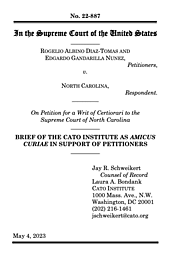Learn more about Cato’s Amicus Briefs Program.
Rogelio Diaz-Tomas and Edgardo Nunez were charged with driving while impaired and driving with a suspended license. Both men failed to appear at their initial court dates, and the district attorney filed a dismissal with leave in each case. As a result, their cases were removed from the court’s docket, and they were left with only one way to dispose of the charge: plead guilty.
Under North Carolina law, the district attorney has the power to file a “dismissal with leave” when a defendant fails to appear at his initial court hearing. A dismissal with leave does not truly dismiss the case; rather, it removes the case from the court’s docket, but the criminal charges otherwise remain pending. Only the prosecutor has the power to reinstate a case after a dismissal with leave is filed. So when Mr. Diaz-Tomas and Mr. Nunez sought reinstatement of their cases, the prosecutor agreed, but only if they pled guilty and waived their right to an appeal.
The defendants challenged this practice, arguing that the state’s use of dismissals with leave violated their right to a speedy trial and their due process rights by forcing them to either plead guilty or remain in legal limbo indefinitely. In support of their argument, the defendants pointed to the Supreme Court’s decision in Klopfer v. North Carolina, in which the Court held a similar North Carolina statute unconstitutional under the Sixth Amendment. However, in distinguishing this case from Klopfer, the North Carolina Supreme Court found that the defendants’ failure to appear justified the district attorney’s refusal to reinstate the case absent a guilty plea. Both defendants filed a cert petition asking the Supreme Court to reverse the opinion below. Cato filed an amicus brief in support of this petition explaining how decisions like the one below prioritize efficiency over the fair administration of justice and how practices like coercive plea bargaining, if left unchecked, will cause the jury trial to vanish from our criminal justice system entirely.
Our Constitution prescribes certain procedures necessary for the protection of liberty which are fundamental to the American scheme of justice. While not always convenient, these procedures are safeguards against arbitrary and corrupt government action and cannot be disregarded in the interest of efficiency. Unfortunately, efficiency has become a priority in our criminal justice system, and the opinion below is just one example of how constitutional protections have been eroded in the interest of achieving quick and easy convictions. This case likewise illustrates how the practical elimination of modern jury trials is driven in large part by exactly the sort of coercive plea-bargaining tactics employed by the State of North Carolina.
The Supreme Court should grant the petition and summarily reverse to ensure criminal defendants have access to the rights afforded to them by the Constitution and that the unchecked use of coercive plea-bargaining tactics does not result in the wholesale erosion of the criminal jury trial.

This work is licensed under a Creative Commons Attribution-NonCommercial-ShareAlike 4.0 International License.

